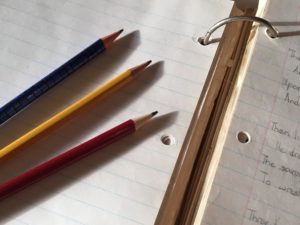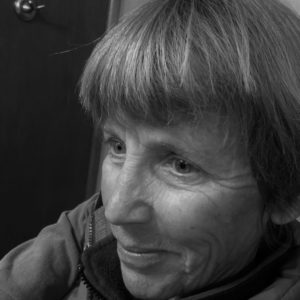 When I was 11 or 12, I developed rituals around perfection in order to enshrine it. A certain chaos ruled my house—five kids, two parents, several dogs, cats, rodents, even a skunk and a raccoon at one point. My siblings were born loud and messy, and I was not. I was born tidy and reflective. I developed ways of preserving a comfortable space around me by following patterns—always go out the same door you came in (our apartment had an abundance of doors), always step across a threshold with the left foot first and always put the right arm into a sleeve before the left. Finally, the ritual I developed as a way to protect my world was writing. And rewriting. I could make a perfect something out of ordinary words. It has taken me many years to understand that life isn’t in the perfect something; it’s in the mess.
When I was 11 or 12, I developed rituals around perfection in order to enshrine it. A certain chaos ruled my house—five kids, two parents, several dogs, cats, rodents, even a skunk and a raccoon at one point. My siblings were born loud and messy, and I was not. I was born tidy and reflective. I developed ways of preserving a comfortable space around me by following patterns—always go out the same door you came in (our apartment had an abundance of doors), always step across a threshold with the left foot first and always put the right arm into a sleeve before the left. Finally, the ritual I developed as a way to protect my world was writing. And rewriting. I could make a perfect something out of ordinary words. It has taken me many years to understand that life isn’t in the perfect something; it’s in the mess.
For many years I taught poetry to elementary school kids on the Navajo Nation. Their writing thrilled and humbled me. Their work was never saddled with perfection. Most of them had no idea what a poem was, but they caught on quickly when I told them we could think of it as a song. Their sense of place ran deeply in their work. I have never taught a group of children with a stronger sense of home. They wrote ferociously, rapidly and passionately, only hindered by the dearth of pencil sharpeners in the room and their unwillingness to spell things wrong.
“Spelling doesn’t count,” I reminded them. “Not with poems and not today.” I was needlessly concerned that their striving for correctness would break the spell. I didn’t yet understand that there was no spell, there was no magic, there were no magicians. There were only kids, eager to burst into creative flame on being given the tools to do so, and the tools were as simple as paper and pencil.
The year the Tuba City students swept the Coconino County Poetry Contest was, in many ways, the apex of my career. Not just as a teacher but as a writer. As a writer, necessarily in love with language, I hoped my students’ efforts would be recognized and understood, so when they won first, second, third prize or honorable mention at every grade level, competing against all the other schools in the county, the principal decided to rent a couple of buses. The whole student body would attend the awards ceremony at the Orpheum Theater.
It might have been the Oscars. The kids poured out of the buses and into the cave-like darkness of the Orpheum, some of them in traditional dress, others in blue jeans and T-shirts. They were wild and high and no one stayed in a seat for long. During the ceremony, one particular student, Hosteen, a student I’d been working hard with all year, went up to the stage to read his poem. He read it in almost a whisper and returned to his seat. A few more kids read, winners from other schools, then I noticed Hosteen’s arm in the air.
“Hey!” he called out. “Can I read another one?” Without waiting for an answer he jumped up and climbed to the stage and read another poem, this time with the strong, confident voice I knew him capable of. He returned to his seat, leaving the adults on stage somewhat bemused, and the ceremony continued. But five minutes later, Hosteen hopped up on the stage again, waving a freshly-scribbled poem in the air. “I just wrote it,” he beamed, and not waiting for a yes or no from anyone, he read his third poem and the theater erupted in applause. Several more students caught on to this instant attention-getter and quickly wrote their own second and third poems and, waiting for permission from no one, jumped up on the stage and read aloud. It was one of the finest moments of creative theater I’ve ever seen.
When the excitement finally died down, the Tuba City heroes got back on the bus and headed home. I was told that the poetry-writing didn’t stop there, that when pencils and paper ran out, kids were dictating poems to one another all the way back to school. It was dark by then, so they couldn’t see the land change from Flagstaff pines and peaks, to the cinder cones and distant Gray and Shadow Mountains and the open grazing lands of home. A messy landscape reflecting the volcanic chaos of hundreds of thousands of years ago. A landscape of fiery imperfection. My students didn’t need to see it that night, this land that gave them their poems. It was well-lodged in every child on that bus. Here is some of what they wrote:
GOODBYE
I say goodbye. I walk the mountain.
You sit in the hogan and cry.
I say goodbye. I’m going to the holy spirit land.
I shall say my last goodbyes.
I pay my last respects.
I run to the mountain with my black jet stones,
My abalone shell, white shell, and my turquoise shells,
Place them in their directions and go to the holy land.
I walk the mountain and there I lie in the dark
Watching the sky and the night stars, and moon girl.
I close my eyes and I breathe and there you are,
Sitting before me, sitting with me.
-Mariah Provencial
STAR ON FIRE
I know a place that is so quiet you just
hear your own footsteps and when you breathe.
No one has ever found the place I have found
but every animal you can think of is there,
and when you think there is land that ends,
it will never end, it won’t, and at night
when you look in the sky you will see only one
star that is on fire and it is always
facing the east.
-Nakona Scott
DRAGON SONG
I am a son of Phil Bedonie.
I live on top of a mesa.
My dragon is made of rough rocks.
His teeth are made of moist sharp mountains.
His roar is thunder sounds coming from the cloudy skies.
His wings are made of a kind of cloth that can be seen through.
-Phillip Bedonie
BIRD
The day I was born
I saw my mom and dad
The next day a bird was singing
I tried to catch it
But I didn’t
It was singing a dark song
-Eldon Clark

